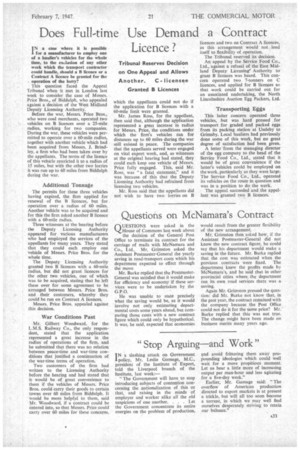Does Full-time Use Demand a Contract Licence ?
Page 51

If you've noticed an error in this article please click here to report it so we can fix it.
Tribunal Reserves Decision on One Appeal and Allows Another. Clicensee Granted B Licences IN a case where it is possible 1 for a manufacturer to employ one of a haulier's vehicles for the whole time, to the exelasion of any other work which the transport contractor could handle, should a B licence or a Contract A licence he granted for the operation of the lorry?
This question faced the Appeal Tribunal when it met in London last week to consider the case of Messrs. Price Bros., of Biddulph, who appealed against a decision of the West Midland Deputy Licensing Authority.
Before the war, Messrs. Price Bros., who were coal merchants, operated two vehicles on B licences over a 25-mile radius, working for two companies. During the war, these vehicles were permitted to operate over a 60-mile radius, together with another vehicle which had been acquired from Messrs. J. Bendley, a firm who had been taken over by the appellants. The terms of the licence of this vehicle restricted it to a radius of 15 miles, but with the other two lorries it was run up to 60 miles from Biddulph during the war.
Additional Tonnage The permits for these three vehicles having expired, the firm applied for renewal of the B licences, but for operation over a radius of 60 miles. Another vehicle was to be acquired and for this the firm asked another B licence with a 60-mile radius.
Three witnesses at the hearing before the Deputy Licensing Authority appeared for various manufacturers who had employed the services of the appellants for many years. They stated that they could each employ one vehicle of Messrs. Price Bros. for the whole time.
The Deputy Licensing Authority granted two B licences with a 60-mile radius, but did not grant licences for the other two vehicles, one of which was to be acquired, stating that he left these over for some agreement to be arranged between Messrs. Price Bros. and their customers, whereby they could be run on Contract A licences.
Messrs. Price Bros. appealed against this decision.
War Conditions Past Mr. Gilbert Woodward, for the L.M.S. Railway Co., the only respondent, stated that the application represented a great increase in the radius of operations of the firm, and he submitted that there was no relation between peace-time and war-time conditions that justified a continuation of the war-time terms of operation.
Two customers of the firm had written to the Licensing Authority before the hearing and had stated that it would be of great convenience to them if the vehicles of Messrs. Price Bros. could carry their goods to certain towns over 60 miles from Biddulph. It would be more helpful to them, said Mr. Woodward, if a contract could be entered into, so that Messrs. Price could carry over 60 miles for these concerns, which the appellants could not do if the application for B licences with a 60-mile limit were granted.
Mr. James Ross, for the appellant, then said that, although the application represented a great increase in radius for Messrs. Price, the conditions under which the firm's vehicles ran for distances up to 60 miles during the war still existed in peace. The companies that the appellants served were engaged on vital export work, and, as witnesses at the original hearing had stated, they could each keep one vehicle of Messrs. Price fully engaged. This, said Mr. Ross, was "a fatal statement," and it was because of this that the Deputy Licensing Authority had refrained from licensing two vehicles.
Mr. Ross said that the appellants did not wish to have two lorries on B licences and two on Contract A licences, as this arrangement would not lend itself to flexibility of operation.
The Tribunal reserved its decision.
An appeal by the Service Food Co., Ltd., against a refusal of the East Midland Deputy Licensing' Authority to grant B licences was heard. This concern operated two 7-tonners on C licences, and applied for B licences so that work could be carried out for an associated undertaking, the North Lincolnshire Auction Egg Packers, Ltd.
Transporting Eggs This latter concern operated three vehicles, but was hard pressed for transport for graded and packed eggs from its packing station at Ussleby to Grimsby. Local hauliers had previously done some of this work, but no great degree of satisfaction had been given.
A letter from the managing director of the egg company to the head of the Service Food Co., Ltd., stated that it would be of great convenience if the latter's vehicles could be employed on the work, particularly as they were large: The Service Food Co., Ltd., operated its vehicles on the route in question and was in a position to do the work.
The appeal succeeded and the appellant was granted two B licences.




















































































